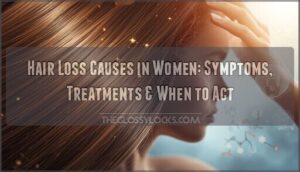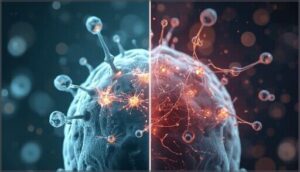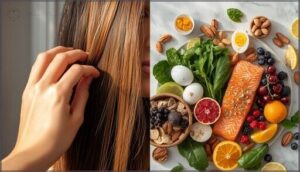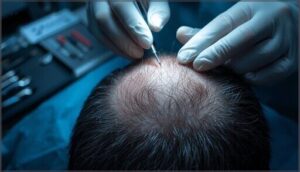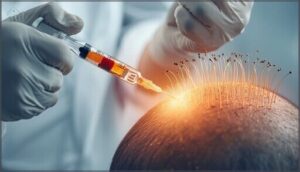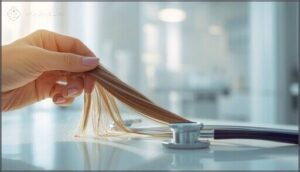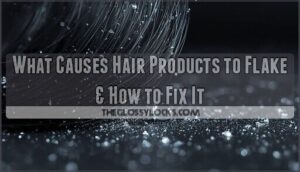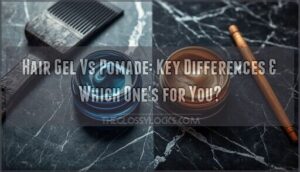This site is supported by our readers. We may earn a commission, at no cost to you, if you purchase through links.
About 30 million women in the United States experience female pattern baldness, yet most don’t recognize thinning until they’ve lost nearly half their hair density. Your wider part, visible scalp, or strands collecting in the shower drain aren’t just signs of aging.
Hair loss in women stems from genetics, hormonal shifts, nutritional gaps, medical conditions, and daily styling choices that damage follicles over time. Each cause leaves distinct patterns and reacts to different treatments. Thyroid dysfunction triggers diffuse shedding across your entire scalp, while elevated androgens from PCOS create male-pattern thinning at your crown and temples.
Understanding what’s driving your hair loss determines whether you need hormone therapy, nutritional supplementation, topical minoxidil, or procedural interventions to restore growth.
Table Of Contents
- Key Takeaways
- What Causes Hair Loss in Women?
- How Hormones and Medical Conditions Trigger Hair Loss
- Nutritional Deficiencies That Lead to Hair Loss
- Hair Loss Treatment and Regrowth Options
- When to See a Doctor About Hair Loss
- Frequently Asked Questions (FAQs)
- What are the common causes of hair loss in women?
- How does hormonal imbalance affect hair loss in women?
- Can stress cause hair loss in women?
- How can diet and nutrition impact hair loss in women?
- Can stress alone cause permanent hair loss?
- Does washing hair too often increase shedding?
- Are there preventive measures for genetic hair loss?
- How long does postpartum hair loss typically last?
- Can diet changes reverse thinning hair completely?
- Conclusion
Key Takeaways
- Female pattern baldness affects 30 million U.S. women and stems from genetics, hormonal shifts, nutritional deficiencies, autoimmune responses, or styling damage—each requiring distinct treatment approaches from topical minoxidil to hormone therapy.
- Thyroid disorders and PCOS drive hair loss through different mechanisms: thyroid dysfunction causes diffuse shedding across your entire scalp, while PCOS elevates androgens that trigger male-pattern thinning at your crown and temples.
- Iron deficiency with ferritin below 30 ng/mL is the most common nutritional cause of hair shedding in women, and correcting it with supplements can restore growth within three to six months.
- Women who seek treatment within six months of noticing changes see 40% higher regrowth rates than those who delay, making early diagnosis through blood tests and scalp examination critical before follicle miniaturization becomes irreversible.
What Causes Hair Loss in Women?
Hair loss in women doesn’t have a single cause. Your hair can thin or shed due to genetics, hormonal shifts, medical conditions, certain medications, or even the way you style it.
If you’re noticing more shedding than usual, exploring the common causes of hair loss in females can help you pinpoint what might be happening.
Understanding what’s behind your hair loss is the first step toward finding the right treatment.
From genetics to hormones and lifestyle factors, exploring the best hair loss remedies for women can help you choose solutions tailored to your specific needs.
Female Pattern Baldness (Androgenetic Alopecia)
Female pattern baldness—the most common hair loss cause in women—affects approximately 30 million in the United States. You’ll notice it when your central part widens or crown thins, though your frontal hairline usually stays intact.
Most cases develop gradually between your 40s and 60s, though hair restoration for women can help slow progression and restore density.
This genetic condition involves:
- Hair follicle shrinkage from dihydrotestosterone sensitivity
- Genetic factors passed through family lines
- Progressive thinning that worsens with age
- Scalp health changes requiring prompt evaluation
Androgenetic alopecia differs from telogen effluvium’s temporary shedding. Early treatment aids hair regrowth. Women experiencing hair loss should understand the female pattern causes to seek appropriate treatment.
Hormonal Changes and Medical Conditions
Hormone imbalance disrupts your hair growth cycle in ways you can control once you understand them. Thyroid disease—both hypothyroidism and hyperthyroidism—causes diffuse thinning and brittle strands. Polycystic ovarian syndrome elevates androgens, triggering female pattern hair loss.
Menopause-related estrogen decline can also shift this balance, which is why understanding the root causes of slow hair growth helps you target the right treatment.
Menopause symptoms include reduced estrogen levels that shift your scalp’s hormonal balance, allowing androgen effects to dominate. These hormonal imbalances often respond well to medical treatment.
Alopecia Areata (Autoimmune Hair Loss)
Your immune system can turn on your own hair follicles, attacking them during their growth phase. This autoimmune response causes alopecia areata—smooth, circular bald patches that appear suddenly on your scalp.
Alopecia areata occurs when your immune system mistakenly attacks hair follicles, creating sudden circular bald patches on your scalp
Unlike androgenetic alopecia, this female hair loss stems from follicle damage by T cells and inflammatory signals.
Hair regrowth happens spontaneously in many cases, though relapses threaten your scalp health long-term.
Medications and Medical Treatments
Certain drugs can trigger hair regrowth disruption or shedding as a side effect. Chemotherapy, blood thinners, and some antidepressants force follicles into the telogen phase prematurely.
Androgenetic alopecia treatment involves pharmaceutical effects that reverse thinning:
- Minoxidil stimulates follicles directly
- Finasteride blocks androgen conversion at 1 mg daily
- Spironolactone reduces hormone-driven shedding
Medical therapy choices depend on your diagnosis and hormonal profile.
Traction Alopecia From Hairstyles
Tight braids, ponytails, and weaves create chronic hair traction that damages follicles at your hairline. This scalp damage appears within months as breakage along frontal and temporal zones.
Fortunately, strategic styling adjustments and density-boosting treatments can reverse much of this damage when you catch it early.
Traction alopecia prevention requires loosening styles, rotating hairstyle risks, and giving your hair rest periods. Without intervention, repeated tension causes permanent female hair loss as follicles miniaturize.
Early recognition of hair loss symptoms allows regrowth if you act quickly.
How Hormones and Medical Conditions Trigger Hair Loss
Your body’s internal systems have a direct line to your hair follicles. When hormones shift or medical conditions develop, your hair growth cycle can stall or stop entirely.
Let’s look at the most common medical triggers that disrupt normal hair growth in women.
Thyroid Disorders and Hair Thinning
Your thyroid might be the hidden culprit behind your thinning hair. Thyroid hormones regulate every phase of your hair growth cycle, and when levels swing too high or too low, hair shedding accelerates across your entire scalp.
Here’s how thyroid dysfunction triggers female hair loss:
- Hypothyroidism slows hair shaft production, creating brittle, coarse strands and diffuse alopecia
- Hyperthyroidism accelerates cycle turnover, causing rapid telogen effluvium and finer hair
- Thyroid autoimmunity overlaps with autoimmune hair loss, compounding the problem
- Both hormone imbalance types cause increased hair shedding without patterned thinning
- Treatment stabilizes hair loss causes within months, though regrowth varies individually
Polycystic Ovary Syndrome (PCOS)
Polycystic ovary syndrome affects 6 to 13 percent of reproductive-age women and frequently triggers female pattern baldness through elevated androgens. Your PCOS diagnosis explains hair thinning over your crown when hyperandrogenism increases androgen sensitivity at follicles, causing miniaturization.
Insulin resistance amplifies this hormonal imbalance by driving ovarian androgen production. Metabolic syndrome compounds these hormonal shifts, making PCOS-related androgenetic alopecia one of the most challenging female hair loss causes to manage.
Understanding the role of hormonal imbalance is essential in addressing the symptoms and treatment of PCOS-related hair loss.
Anemia and Iron Deficiency
Low ferritin levels rob your follicles of the iron they need to sustain healthy growth cycles. Iron deficiency causes telogen effluvium—diffuse shedding that affects premenopausal women most. You’ll notice increased shedding when ferritin drops below 30 ng/mL.
Hair loss treatment options start with correcting iron stores:
- Obtain thorough labs measuring ferritin levels and transferrin saturation
- Begin iron supplements under medical supervision for documented deficiency
- Monitor anemia symptoms including fatigue and scalp dryness
- Expect hair regrowth stabilization within three to six months of repletion
Autoimmune Diseases and Hair Loss
Your immune system can turn on your follicles. Alopecia areata causes discrete patches of hair loss, affecting 2% of the population—women of reproductive age face particular risk. Autoimmune thyroid disease triggers diffuse thinning and telogen effluvium, while lupus compounds female hair loss symptoms through disease activity.
Diagnosis requires clinical examination, pull tests, and sometimes scalp biopsy to guide disease management and hair regrowth strategies.
Nutritional Deficiencies That Lead to Hair Loss
Your body needs specific nutrients to maintain healthy hair growth. When you’re deficient in certain vitamins and minerals, your hair follicles can’t function properly, leading to increased shedding or slower regrowth.
Let’s examine the most common nutritional deficiencies that contribute to hair loss in women.
Iron Deficiency and Low Ferritin Levels
Iron deficiency is one of the most common nutrient deficiencies linked to hair shedding in women. When your ferritin levels drop below 30 ng/mL, you’re at higher risk for female hair loss symptoms. Anemia symptoms often accompany this.
Iron supplements can restore hair density within three to six months, but ferritin testing should guide treatment. Pair iron-rich foods with vitamin C to boost absorption and address hair loss causes effectively.
Vitamin D Deficiency
Beyond iron, vitamin D plays another key role in hair follicle health. Deficiency symptoms include increased shedding and thinning. Women with female pattern hair loss often show low vitamin D levels.
- Sunlight exposure promotes natural vitamin D synthesis in skin
- Dietary supplements correct deficiency when levels fall below 30 ng/mL
- Hair loss treatment may include vitamin D repletion
- Women’s health improves with adequate vitamin D status
- Testing guides appropriate supplementation dosing
Biotin Deficiency
While vitamin D matters, biotin deficiency remains rare in women but carries distinct effects on hair growth. True deficiency presents with brittle hair and increased shedding. Most women consume adequate dietary biotin through eggs, nuts, and whole grains.
Biotin supplements don’t improve hair regrowth unless you’re actually deficient. High-dose supplements can interfere with lab tests and vitamin interactions.
| Biotin Source | Content per Serving |
|---|---|
| Egg (cooked) | 10 mcg |
| Almonds (1 oz) | 1.5 mcg |
| Sweet potato | 2.4 mcg |
| Spinach (½ cup) | 0.5 mcg |
Zinc Deficiency
Like biotin, zinc deficiency rarely appears in isolation but creates visible hair disruption when present. This mineral balance matters for follicle function and protein synthesis.
Hair loss in women from nutrient deficiency often improves with dietary zinc from oysters, beef, and pumpkin seeds. Zinc supplements require caution—excessive intake disrupts copper absorption and worsens hair regrowth rather than helping it.
Omega-3 Fatty Acid Deficiency
Fatty acid imbalance doesn’t generate the dramatic shedding iron deficiency causes, but chronic omega-3 deficiency affects scalp inflammation and follicle health. Women avoiding fish and flaxseed often show this pattern alongside other nutrient deficiencies.
Fish oil benefits for hair loss in women appear modest but real. Omega-3 supplements from salmon, sardines, or walnuts support overall women’s health without targeting female pattern hair loss directly.
Hair Loss Treatment and Regrowth Options
If you’re experiencing hair loss, you have several treatment options that can slow progression or encourage regrowth. The right choice depends on what’s causing your hair loss, how severe it is, and your overall health.
Here’s what works, backed by clinical evidence.
Minoxidil for Female Pattern Hair Loss
Minoxidil stands as the only FDA-approved topical treatment for female pattern hair loss. You’ll see about 18% improvement in hair count after 24 weeks with the 2% solution, while the 5% foam delivers even better results.
Hair regrowth continues as long as you use it consistently. Stop treatment, and you’ll return to baseline within months.
Most women tolerate it well, with mild scalp irritation being the main concern.
Spironolactone and Hormonal Treatments
Hormone therapy with spironolactone offers real promise when minoxidil alone isn’t enough. About 57% of women show clinical improvement, with even better results when you combine treatments. Doses usually range from 50 to 200 mg daily, though you’ll need patience—visible hair regrowth takes at least six months.
What you should know about antiandrogen effects:
- You may notice menstrual changes, breast tenderness, or lightheadedness, especially at higher doses
- Spironolactone blocks testosterone’s impact on hair follicles, helping prevent further thinning and supporting regrowth
- If you’re of childbearing age, you’ll need reliable contraception since this medication can harm male fetuses
Your doctor may also recommend oral contraceptives with low-androgenic progestins. They lower free testosterone and work synergistically with other hormonal treatments for female pattern hair loss.
Hair Transplants and Surgical Options
Surgical restoration becomes viable when you meet strict candidacy criteria—stable, patterned thinning and adequate donor density in the back and sides. Only 5 to 10 percent of women with androgenetic alopecia qualify for hair transplantation.
FUE techniques dominate today, extracting individual follicles with minimal scarring. Graft survival rates reach 85 to 95 percent when you’re carefully selected, though transplant costs generally range from $6,000 to over $15,000 depending on session size.
Low-Level Laser Therapy (LLLT)
Laser hair growth devices deliver red or near-infrared light directly to your scalp, triggering photobiomodulation—a process that ramps up cellular energy in hair follicles. Low-level laser therapy boosts mitochondrial activity, enhances local blood flow, and increases hair shaft diameter without heating tissue.
- FDA-cleared devices include combs, caps, and helmets for home use
- Treatment usually requires two to three 8–25 minute sessions weekly
- Randomized trials show significant increases in hair density after 24 weeks
- Combination with minoxidil produces better outcomes than either alone
Most women with early to moderate female pattern hair loss see measurable improvement. You’ll tolerate LLLT well—adverse effects remain mild and transient.
Platelet-Rich Plasma (PRP) Therapy
PRP injections utilize your own blood’s growth factors to wake up dormant hair follicles. This scalp treatment spins concentrated platelet-rich plasma, then delivers it directly into thinning zones.
Studies in women’s health show hair regrowth from follicle stimulation—hair density jumps roughly 30 hairs per square centimeter after four sessions. Plasma therapy works best when combined with minoxidil for full hair restoration.
When to See a Doctor About Hair Loss
You don’t need to accept hair loss as inevitable. Certain patterns of shedding signal underlying health issues that require professional evaluation. Knowing when to schedule an appointment helps you address treatable causes before they progress.
Recognizing Abnormal Hair Shedding
Your body naturally sheds 100–150 hairs daily, but anything beyond that signals a problem. Telogen effluvium and other forms of alopecia often strike suddenly after a trigger event, disrupting normal shedding patterns.
- Clumps on your brush or shower drain indicate excessive thinning beyond typical daily shedding
- Shedding lasting over 3–6 months requires professional evaluation for female pattern hair loss
- Sudden onset after stress or illness points to telogen effluvium rather than gradual hair loss
- Club-shaped roots on fallen hairs distinguish true hair shedding from hair breakage
- Visible scalp changes alongside increased shedding may signal compromised scalp health
Symptoms That Require Medical Attention
When hair loss comes with sudden bald patches, scalp redness, or pain, your body’s waving a red flag that demands immediate attention. Scalp infections, itchy scalp with inflammation, or excessive shedding paired with fever warrant urgent evaluation.
Rapid progression of female pattern hair loss, hair thinning with unexplained weight changes, or bald patches with scarring require prompt alopecia diagnosis to protect your women’s health.
Diagnostic Tests for Hair Loss
Your doctor starts with a scalp examination to spot inflammation or scarring that signals telogen effluvium or other scalp conditions. Trichoscopy—a magnified look at your follicles—reveals patterns that guide alopecia diagnosis.
Blood tests check ferritin, thyroid, and vitamin D levels. Hair analysis measures shedding intensity.
Dermatology may recommend biopsy procedures if hair loss in women appears unusual or scarring-related.
Frequently Asked Questions (FAQs)
What are the common causes of hair loss in women?
Most women don’t realize thinning starts long before it’s visible. Female Pattern Hair Loss, Telogen Effluvium, hormonal shifts, genetic factors, stress impact, nutrient deficiencies, scalp health issues, and Alopecia Areata drive most cases.
How does hormonal imbalance affect hair loss in women?
Estrogen balance shifts during menopause and pregnancy can trigger female pattern hair loss. Hormonal shifts in women’s health, combined with cortisol impact from stress, accelerate shedding by disrupting hormone regulation and follicle miniaturization.
Can stress cause hair loss in women?
Yes. Acute stress triggers telogen effluvium, causing diffuse shedding two to three months later.
Chronic stress disrupts your hair cycle through hormonal shifts, but managing emotional triggers helps restore density within six to twelve months.
How can diet and nutrition impact hair loss in women?
Your dietary choices directly influence follicle health. Iron intake, vitamin balance, and targeted hair supplements support hair growth cycles.
Nutrition planning with strategic dietary changes strengthens strands, particularly for female pattern hair loss prevention in women’s health.
Can stress alone cause permanent hair loss?
Worry wears many hats, but baldness isn’t usually one of them. Stress management matters because emotional triggers push follicles into telogen effluvium—temporary hair shedding lasting three to six months.
Chronic stress rarely causes permanent hair loss, though it may unmask female pattern hair loss or alopecia areata.
Hair loss prevention starts with addressing the root stressor.
Does washing hair too often increase shedding?
Daily shampoo frequency doesn’t cause hair loss. Gentle washing removes loose hairs already shedding naturally.
Harsh scrubbing or chemical treatments harm scalp health, but your regular hair care routine won’t trigger female pattern hair loss.
Are there preventive measures for genetic hair loss?
Genetic hair loss prevention begins with early intervention. Minoxidil stabilizes female pattern hair loss when started early, while gentle hair care and anti-androgen medications like spironolactone slow progression in women’s health management.
How long does postpartum hair loss typically last?
Most postpartum telogen effluvium lasts three to six months after delivery, with hair regrowth gradually returning as hormonal balance restores.
Complete normalization of hair shedding usually occurs within six to twelve months postpartum.
Can diet changes reverse thinning hair completely?
If your thinning stems from iron deficiency or zinc depletion, nutrient supplements and improved dietary patterns can fully reverse shedding within six to twelve months.
However, genetic hair loss treatment requires medication alongside hair care tips.
Conclusion
Women who address hair loss within six months of noticing changes see regrowth rates 40% higher than those who delay treatment. Waiting for spontaneous improvement allows follicle miniaturization to advance beyond reversibility. Schedule your dermatology consultation when shedding persists beyond three months or creates visible scalp exposure.
Your response to hair loss causes in women depends on accurate diagnosis—thyroid panels, ferritin levels, and scalp examinations reveal whether you need medication, dietary changes, or procedural interventions.
- https://pmc.ncbi.nlm.nih.gov/articles/PMC6322157/
- https://academic.oup.com/jcem/article/104/7/2875/5342938
- https://pubmed.ncbi.nlm.nih.gov/11251562/
- https://thepsychodermatologist.com/itchy-scalp-and-hair-loss-female-thyroid/
- https://www.jernigans.com/can-women-suffer-hair-loss-from-low-vitamin-d-and-iron/

